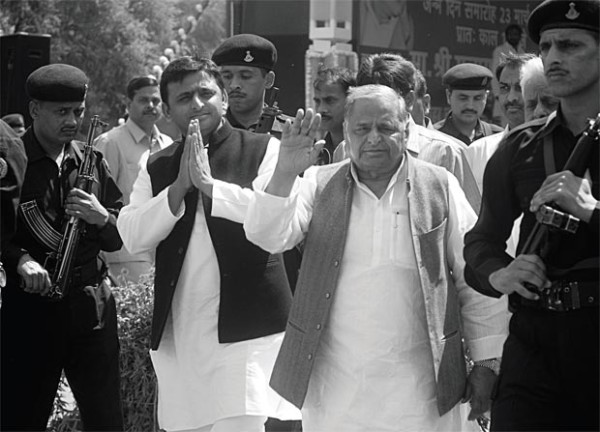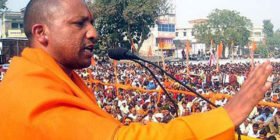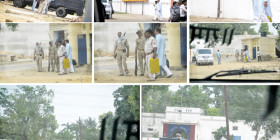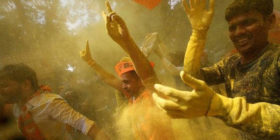In Pic :earning curve Akhilesh Yadav still has a long way to go before stepping out of his father Mulayam’s shadow
Hope sprang eternal when Akhilesh Yadav took over as UP’s youngest CM. Virendra Nath Bhatt and Brijesh Pandey chronicle how things have gone awry 10 months on.
AFTER GETTING a glowing report card of 100 out of 100 from his father and Samajwadi Party (SP) supremo Mulayam Singh Yadav on the completion of 100 days in office last June, the euphoria of being Uttar Pradesh’s youngest chief minister is fast wearing out for Akhilesh Yadav. Last March, Akhilesh proved his political nous as his message of hope was instrumental in propelling the party to power. But with each passing day, there is growing evidence that the 39-year-old has failed to replicate the same quality in the chief minister’s chair.
Of late, Mulayam, 73, has been getting vocal about the government’s faults. At a meeting in Etawah on 14 January, he said he was receiving a lot of complaints about the regime’s functioning. He advised party leaders not to put pressure on the government for transfers and postings. Things came to a head when he publicly rebuked Akhilesh in Lucknow on 18 January, saying his son was not aware of the ground realities. A stunned Akhilesh sought a week’s time for putting his house in order.
The faultlines are out in the open, and each rebuke by Mulayam makes Akhilesh look less like a CM and more like a novice. So, what has changed in less than a year for the SP prince? Is he really responsible for the bureaucratic stranglehold on policymaking and the resultant paralysis? Or is the wily old Mulayam playing devil’s advocate just to ensure that the party is not drunk on power as it prepares for the 2014 General Election?
The famed ‘pancham tal’ — the chief minister’s office on the fifth floor of the secretariat building in Lucknow — is back in the news, albeit for all the wrong reasons. When Mayawati was in power, a band of bureaucrats led by Cabinet secretary Shashank Shekhar Singh managed the BSP government’s business as per her whims and fancies. For five years, the fifth floor kept the babus, ministers and BSP functionaries on a tight leash. Though things are a lot more democratic since Akhilesh took over, the criticism remains the same.
The government’s plight can be gauged from a story narrated by a party insider, who recalled the predicament faced by SP leader Ram Gopal Yadav. “When the BSP was ruling the state, Mayawati issued the transfer order of his brother’s son-in-law within 30 minutes,” he says. “But when the SP came to power, it took more than three months for a similar request.”
So, is Mulayam right in being overtly critical of the bureaucracy? If Akhilesh is unable to assert himself over the bureaucracy, much of the blame lies with Mulayam, says a senior IAS officer on the condition of anonymity. “Akhilesh has not been allowed to choose the team of his choice. Last March, he had posted Sanjay Agrawal as his principal secretary, but he had to withdraw the order within 24 hours,” he says. “So, how can you expect the bureaucracy to honour the directions issued by the CM’s secretariat? They only heed the words of Anita Singh, the secretary in the CM’s secretariat, who is Mulayam’s choice.”
This is not a one-off case. Another bureaucrat had an interesting tale about the power wielded by Anita Singh. “The launch of the 1090 helpline for women in UP, was attended by the CM and the entire bureaucracy,” he recalls. “After the CM’s speech, the additional director-general (law & order) was proposing the vote of thanks. Anita Singh, who was sitting in the front row, beckoned Lucknow DIGNavneet Sikera from the dais and whispered something in his ear. After the vote of thanks, the ADG invited everyone for tea and snacks. When Akhilesh and the bureaucrats got up to leave, Sikera said that as it was the launch of a helpline for women and since no woman got a chance to speak, ‘madam Anita Singh would like to say a word or two’. Can you imagine any officer doing this? While Anita Singh lectured on what needs to be done, Akhilesh squirmed in his seat, looking irritated and pretending to read a file. It’s a grave breach of protocol, but nothing happened. She conveyed a clear message that she is the boss.”
Rumour has it that Akhilesh does not make time for any key policy meetings with senior bureaucrats or the media; and that he looks more interested in trying to keep the party cadres happy. “He still hasn’t understood that he is the chief minister. He still thinks of himself only as party chief,” quips a senior bureaucrat.
That is not all. The corridors of power are filled with chatter about how the interests of certain officers are protected by powerful business houses. Mahesh Gupta, who was the excise commissioner during the BSP regime, continues to hold the same position because of his alleged proximity to the late liquor baron Ponty Chadha. “With the backing of powerful industrial houses, it becomes impossible to touch them, so they become power centres of their own,” says another bureaucrat.
Though Akhilesh hasn’t inducted anyone from his core team in his Cabinet, they have been accommodated in other posts. Sunil Yadav remains the CM’s political eyes and ears and is tipped to get a seat in the Lok Sabha polls. While Javed Abidi has been made a Pollution Control Board member, former RJNaved Siddiqui is now the Sangeet Natak Akademi chairman.
When it comes to poll promises, Akhilesh’s report card makes for grim reading. The only promise that he has been able to keep so far is the distribution of the unemployment dole and financial assistance for girl students. But the implementation of these hasn’t been free from controversy. Many students allege that genuine beneficiaries have been left out and the kith and kin of ministers and MLAs have been included. There is some progress in the implementation of the CM’s flagship programme: the distribution of free laptops and tablets to students. On 23 January, it was announced that the contract to supply 15 lakh laptops has been awarded to HP at a cost of Rs 2,858 crore. But most of the other promises remain only on paper (see box).
HOWEVER, IT’S not just Akhilesh’s inexperience that has landed the fledgling government in a mess. The main reason is the power struggle within the first family of the SP that was spurred by Akhilesh’s elevation to the top job. Now, every family member wants to ensure his/her share in the power pie. Mulayam’s brother and PWD Minister Shivpal Yadav gave a hint of the tussle when he remarked, “Had I been a heavyweight leader, I would have become the CM.” Last March, Shivpal was the only person in the family who openly opposed Akhilesh’s elevation. He wanted Mulayam to become the CM again.
“It’s a classic case of dynastic politics. When the family patriarch gets old, the succession war starts. The SP is no exception,” says political analyst Ashutosh Mishra. “The family, the SP’s unifying factor, has turned into its own adversary. The family has become the fundamental faultline in intra-party affairs. It has led to a policy paralysis in the state. This is corroborated by Mulayam’s statement at a meeting of MLAs and state executive, where he pulled up the ministers for non-performance and ignoring the party cadres.”
But Shivpal is not just worried about the top post. He is also wary of Ram Gopal’s rise and their famed rivalry which ensures that there are constant skirmishes. Propping up the name of Prateek Yadav, (Mulayam’s son from his second wife Sadhna Gupta) first as a Lok Sabha candidate from Kannauj and then from Azamgarh, is being seen as Shivpal’s handiwork. According to party insiders, if Prateek fights and wins, he too would be an alternative power centre and Mulayam will have to use all the tricks of the trade to ensure that there is no bad blood between Akhilesh and Prateek. Shivpal is keen to exploit that since he knows that with this constant headache, his chances at realpolitiking increase.
Mulayam is banking on the 2014 General Election to play a bigger role at the Centre. He is aiming for at least 50 seats. He knows that if the SP bags a big haul, it will not only increase his influence in New Delhi, but he will also be in a position to accommodate many of his family members at the Centre, thus leaving the state for Akhilesh. This constant criticism of his son and the government is seen by many as a trick to keep power centres such as Shivpal and Azam Khan under check.
AFTER A LONG spell of communal violence in the wake of the VHP’s kar seva call at Ayodhya in 1990 and the Babri Masjid demolition in December 1992, UP had witnessed relative calm for more than a decade. During the Mayawati regime, the state remained peaceful even when the Lucknow Bench of the Allahabad High Court delivered its verdict on the title suit of the disputed land at Ayodhya in September 2010. But violence has returned with a vengeance and UP has witnessed riot after riot since Akhilesh became CM.
| SP’s Report Card |
| The only poll promise that Akhilesh Yadav has been able to keep so far is the distribution of the unemployment dole and financial assistance for girl students. But the implementation hasn’t been free from controversy. Many students allege that genuine beneficiaries have been left out and those from the families close to ministers/MLAs have been included |
| There is some progress in the implementation of the CM’s flagship programme: the distribution of free laptops and tablets to students. On 23 January, it was announced that the contract to supply 15 lakh laptops has been awarded to HP at a cost of Rs 2,858 crore |
| Plans to build a super-speciality cancer hospital and the construction of an international cricket stadium in Lucknow have made no progress |
| Last September, Akhilesh laid the foundation stone for a dairy plant in Lucknow with an installed capacity of 5 lakh litres of milk every day. The project remains on paper |
| The CM announced plans to build a 270- km expressway linking Agra with Lucknow at a cost of Rs 10,500 crore. A consultant was appointed only earlier this month |
| At his maiden budget last June, the CM had announced plans to build a park spread over 500 acres named after socialist ideologue, Janeshwar Mishra, and also the Jayaprakash Narayan International Centre. Both projects remain only on paper |
| Similar is the fate of the Rs 15,000 crore Metro rail project for Lucknow. Much progress was made during the previous BSP regime. But Akhilesh announced last year that his government would prefer a Bus Rapid Transit System over the Metro |
| The government has failed to distribute free blankets to the poor as the state reels from one of the worst cold waves in history. Officially, more than 250 people have died, but not a single blanket was distributed even though the budget had a provision of Rs 33 crore |
“Uttar Pradesh has 75 districts, out of which 44 are always declared as sensitive by the Election Commission during poll time. This suggests that the communal tension in UP cannot be allowed to fester,” says a senior police officer.
On 18 May 2012, Akhilesh met senior police officers for reviewing the state’s law and order situation. He issued strict instructions and gave the officers a month to set things right or else face action. Exactly two weeks later, communal violence broke out in Asthan village of Pratapgarh district where 45 houses of Muslims were looted and burnt. The clash occurred following the alleged rape and murder of a Dalit girl by a Muslim youth.
On 1 June, tension erupted in Kosikalan town of Mathura district and more than a dozen shops were looted and several houses burnt down. The town remained under curfew for more than a week. Alleging police discrimination, traders downed their shutters for a month. Yet no political initiative was taken by the government to defuse the situation. Its usual response was to replace the district magistrate and the district police chief. A BSP MLC and his elder brother and former minister Chowdhary Lakshmi Narayan were also booked for allegedly fomenting the riots, leading to a strong protest from the Opposition party.
More riots followed in July and August. On 22 July, the first day of fasting during the holy month of Ramzan, trouble began in Bareilly when a group of Kanwarias clashed with Muslims who were offering prayers after breaking fast. The clashes soon spread to nine other places in the city and curfew had to be imposed. Two weeks later, the district administration allowed a religious procession of Hindus in a Muslim- dominated locality. The procession was attacked, leading to a fresh bout of violence, in which two persons were killed. Once again, the government was accused of allowing the situation to simmer.
The BJP alleges that the district administrations of Lucknow, Allahabad and Kanpur were to be blamed for the large-scale violence on 17 August. Several Muslim outfits had given a call for protest marches against the persecution of Muslims in Assam and Myanmar, yet no preventive measures were taken by the administration. In Lucknow, the vandals had a free run; they attacked a journalist, television channel cameramen and women and also damaged the statues of Buddha and Mahavir. Akhilesh sought to defuse the situation by announcing a compensation for the losses suffered by the mediapersons. Similar is the story of Masuri town near Ghaziabad, where the situation got out of hand over a trivial issue and Muslims gheraoed the police station. The police fired in selfdefence and shot dead six Muslim youth.
The twin towns of Ayodhya-Faizabad remained peaceful in 1990 and ’92 but communal riots erupted simultaneously in five towns of Faizabad district on 24 October 2012. “A statue was stolen from the Kali temple in the last week of September. Locals were getting restive and the BJP was quick to capitalise on the situation,” says VN Das, a retired college principal. “Everybody in Faizabad, except the district administration, knew that a communal clash was imminent on Dussehra. As expected, on the pretext of eve-teasing, both the communities clashed in the heart of the town and more than 40 shops were looted.”
Hashim Ansari, 91, the oldest surviving plaintiff in the Babri Masjid-Ram Janmabhoomi dispute, squarely blamed the Sangh Parivar for the communal disturbances in the city. “They are desperate to regain lost ground as the BJP had been winning the Ayodhya seat consecutively from 1991 to 2007. This time they lost to the SP,” he says.
However, the BJP denied the charge. “The SP government is doing these things for vote-bank politics,” says senior BJP leader and Lucknow MP Lalji Tandon. “The SP is appeasing Muslims so that their votes will not be divided amongst the many ‘secular’ parties in the 2014 election.”
Interestingly, a senior bureaucrat believes that there is some truth to this theory. If there is a sense of insecurity among the minorities, there will be a stronger feeling that Mulayam is their only saviour, he says. In the Assembly polls, Muslims by and large vote for the SP. But in Lok Sabha polls, the situation is different. In the 2009 Lok Sabha polls, one of the factors responsible for Muslims voting en masse for the Congress was the fear that the SP and BSP won’t be able to contain the BJP. For example, Zafar Ali Naqvi, the Congress candidate from Lakheempur was not sure about his victory in 2009, but prevailed because of the polarised voting. However, in the 2012 Assembly election, his son lost his deposit from the same constituency.
“In most places, the response of the police and the administration was not up to the mark,” adds the bureaucrat. “If they had acted swiftly, large-scale rioting could have been prevented. One of the reasons why no riots happened during Mayawati’s regime is that she had given a free hand to the police when it came to situations like these. So until and unless someone has a vested interest, why would you allow a law and order situation to deteriorate?”
With the recent shunting of powerful IAS officer Anil Gupta after he was admonished by Mulayam, party sources are indicating that a major Cabinet and bureaucratic reshuffle is in the offing. Until that happens and galvanises the party, it won’t take long for the umeed ki cycle (cycle of hope) to become na-umeed ki cycle.






Leave a reply